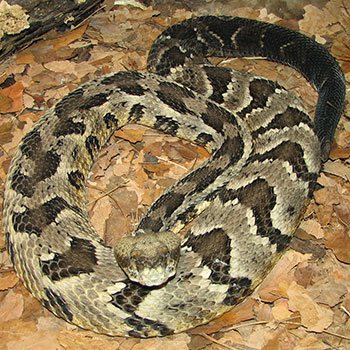Population genetic research is important for both wildlife forensics and wildlife management.
Here at the DNA Lab we conduct various population genetic research projects to answer questions about a particular species. Understanding the diversity, size and gene flow of a population is important for establishing state management programs. Projects are a combination of internal research, undergraduate and graduate thesis research and contract work with outside agencies.
If you are a state agency, looking to have genetic analyses conducted please contact us at (570) 422-7892 or wildlifedna@esu.edu.

Habitat fragmentation occurs when an organism’s environment is divided into smaller, more isolated segments, often times resulting in population decline and ecosystem decay. Carnivores are especially vulnerable to these effects due to their low densities, large home ranges, and low tolerance by humans. By utilizing molecular techniques on collected hair samples, we can monitor population size and density in an effort to protect populations from severe decline.
In this collaboration with the New Jersey Division of Fish and Wildlife, sites were chosen throughout New Jersey to set up either a cubby or rubbing tree station to collect hair samples from bobcats in a non-invasive manner. Both station types were set up with bait, a camera, and either gun brushes or adhesive tape in an effort to collect hair when the bobcat entered, exited, or brushed by.
Confirmation that collected samples were bobcat hair was achieved by extracting DNA and using a real-time polymerase chain reaction (PCR) protocol which targeted genes specific for bobcats. Microsatellites were then targeted and amplified using a multiplex PCR protocol. Each of the 6 microsatellite sites targeted were fluorescently labelled to be detected by the genetic analyzer. Once amplification of the microsatellite sites were complete, samples were genotyped using a genetic analyzer and the resulting genetic profiles were analyzed.
Of the 323 hair samples collected in the first field season, 42 were selected for further analysis through observation of morphological characteristics via microscopy. Upon further analysis, samples were considered truly positive if real-time PCR provided a positive result and there was footage on the camera showing a bobcat, or both real-time PCR and DNA sequencing provided a positive result. A total of 15 samples were confirmed as truly positive via real-time PCR and footage on the camera, and 2 were confirmed by positive real-time PCR and DNA sequencing results.
Due to low-yield DNA samples, genetic profiles via genotyping were created for only 25% of the 17 positive samples making it difficult to assess the data using a mark-recapture model. In the future, a presence-absence approach will be used to make population size and density estimates.
Several other species contributed hair samples to this study including, raccoon, gray squirrel, grey fox, red fox, opossum, fisher, skunk, black bear, whitetail deer, domestic dog, and domestic cat.
In this ongoing study, ticks were collected from black bears (Ursus americanus) in New Jersey and Pennsylvania and tested for the presence of Lyme disease and POW virus lineage II. To confirm infection, a TaqMan real-time polymerase chain reaction (PCR) assay was used to detect the 16S-23S intergenic spacer specific for Borrelia burgdorferi, the causative agent of Lyme disease, and a SYBR green reverse transcriptase real-time polymerase chain reaction assay was used to detect the NS5 gene specific for POW virus lineage II.
Additionally, the average tick load on black bears will be analyzed to determine their role in hosting, transporting, and spreading tick borne pathogens. The New Jersey Division of Fish and Wildlife and Pennsylvania Game Commission are active contributors to this study.
Results of this study will be available upon completion of testing. For more information on this project please email Wildlife DNA.

By Eric Januszkiewicz, Nicole Chinnici, and Thomas C. LaDuke
Timber Rattlesnakes (Crotalus horridus) have experienced habitat loss, population fragmentation, and extirpation throughout their range in the Northeastern United States. Information regarding the genetic variation of this species can be used for conservation management efforts.
Polymerase chain reaction (PCR) technology has allowed for the rapid advancement of genetic studies in recent years. Multiplex PCR is one technique that is increasingly being used because of its various applications. This technique makes it possible to amplify multiple loci of the genome at one time. By amplifying a greater number of loci at a time, the cost for analysis of multiple samples is greatly reduced and the process is made significantly more efficient.
A multiplex of nine primers was designed for genotyping populations of C. horridus to evaluate genetic variation. DNA was used from shed skins, tissue samples, and scale clippings. Samples are still being collected and tested to increase the sample size and start building up a database. The objective of this research is to optimize this nine microsatellite multiplex PCR reaction, and to evaluate the success of this on various sample types. This multiplex could prove to be a useful tool for population analysis of C. horridus.
A future study can use this multiplex to genotype large numbers of C. horridus. A database would log every sample collected. This can then be used for subsequent research including population studies that look at the genetic diversity within and among populations. A study such as this can be repeated in the future and compared to observe changes in the populations’ genetics over time. This is a way of monitoring C. horridus populations, and can certainly aid in conservation efforts if the species begins to show a decline in health or numbers.

The Northeast Wildlife DNA Laboratory received grant funding through the State of New Jersey Department of Environmental Protection to evaluate population genetics in wood turtles (Glyptemys insculpta).
In collaboration with NJDFW, wood turtle surveys were conducted in the spring and fall of 2015. Each turtle captured was given a unique notching identification number.
Morphometric measurements, blood, scale clippings and leeches were collected from a total of 33 turtles in the spring of 2015.
Fall collection is still underway and is expected to be completed November of 2015. The objective of the study is to evaluate the genetic diversity of the wood turtle population through northwestern NJ.
The study also aims to identify genetic structure and divergence between sample locations.
 The genetic analysis of the Pennsylvania elk herd completed in this study has identified
the herd as having significantly less genetic diversity as compared to elk populations
in other areas of the United States.
The genetic analysis of the Pennsylvania elk herd completed in this study has identified
the herd as having significantly less genetic diversity as compared to elk populations
in other areas of the United States.
Genetic diversity was lost in the Pennsylvania elk herd during the periods after reintroduction when the total elk population dropped to a low number and remained that way for many decades.
The finding that the Pennsylvania elk herd consists of a single, mixing population, was determined by this study.
There has not been enough time for structure to develop and significant gene flow exists between the different elk groups located in the Pennsylvania elk management area. Population structure may develop over time.
 By Nikolai Kolba and Larry Laubach
By Nikolai Kolba and Larry Laubach
As with any reintroduction program, the overall genetic diversity of the population is a concern in maintaining the long-term viability of that population.
Currently the population genetic parameters of PA river otters indicate a diverse population.
Observed heterozygosity is within an acceptable range of what would be expected.
Three population structure groups have been identified in the state and appear to coincide with 3 geographic regions: northeast, north central, and south central.
The southeast population is comprised of relatively equal proportions of each of those groups.
Only ten years have passed from the completion of the PRORP, therefore, this study provides good baseline data for both management and future study.
It will be important to continue to sample the river otter population to see how the population structure changes given more generations.
 The population of brown trout from the Pequest fish hatchery demonstrated a loss in
genetic diversity illustrated by the low number of unique alleles (6) and average
number of alleles (7.83) when compared to the wild reproducing population (33 and
12.17, respectively).
The population of brown trout from the Pequest fish hatchery demonstrated a loss in
genetic diversity illustrated by the low number of unique alleles (6) and average
number of alleles (7.83) when compared to the wild reproducing population (33 and
12.17, respectively).
Although the observed heterozygosity was slightly greater then 0.600, the low number of alleles shared among this population is lower than a wild reproducing population.
Further evaluation with a larger sample size would give a better representation for the differences in the genetic profiles between two populations.
The six unknown furunculosis samples were genetically different from the wild reproducing and hatchery population except for sample 1-2 which has similarities to all three populations.
The genotypic analysis of these samples indicates they are from another population.
This is shown by the nine unique alleles present and the population cluster that was represented by Bayesian clustering analysis.
 By Nicole Chinnici
By Nicole Chinnici
Black bears in New Jersey are a contiguous population. Over the last 30 years, NJ’s black bear population has been increasing and expanding its range southward and eastward from the forested areas of northwestern NJ.
The population has grown due to increased black bear habitat.
We evaluated aspects of genetic diversity and gene flow for 4 management zones in NJ using genotypic data from 9 microsatellite loci.
Measures of genetic diversity were estimated at the individual level, as well as within and between management areas.
Average expected heterozygosity, average number of alleles, total number of alleles, number of unique alleles, average variance in number of repeats, and average range in number of repeats were determined from microsatellite data using the program Cervus 3.0.
A total of 84 alleles were observed at the 9 microsatellite loci amplified in a multiplex reaction.
The degree of variation ranged from 6 to 12 alleles per locus, with an average of 9.33 alleles per population at each locus.. Results from STRUCTURE 2.3.4 suggest that NJ black bears represent a panmictic population.
 The eastern wild turkey is native to Pennsylvania and New Jersey. Historically, the
wild turkey was found throughout the United States but experienced rapid population
declines due to European settlement.
The eastern wild turkey is native to Pennsylvania and New Jersey. Historically, the
wild turkey was found throughout the United States but experienced rapid population
declines due to European settlement.
To increase the wild turkey population in Pennsylvania, game farms were established to raise wild turkeys and translocate them throughout the state.
To determine the population dynamics eastern wild turkeys were assessed for genetic diversity and gene flow. In cooperation with the Pennsylvania Game Commission, feather samples were collected.
Through DNA extractions and a ten microsatellite multiplex reaction, genotypic profiles were constructed. Diversity was assessed through the average observed heterozygosity and total number of alleles per locus.
Contact Us

